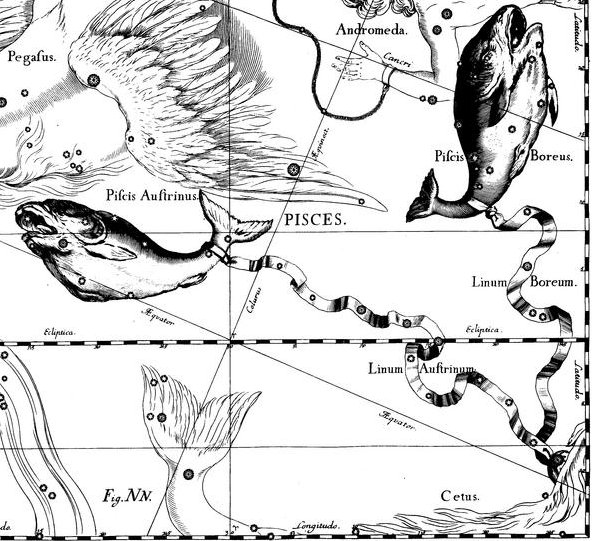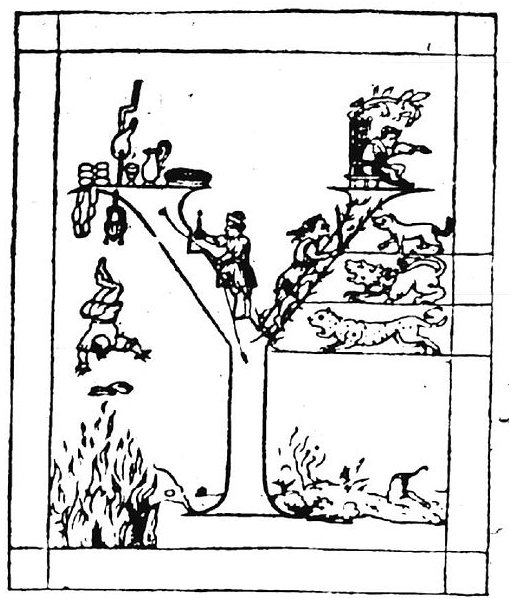The mouth of the fish (Fomalhaut) -
which in Roman times rose with the Sun in day 400 -
came 33 days after Albali (314), which resembles the
ideal Hawaiian measure of 33 days from the reappearance
of the Pleiades to the kali'i battle:
... in
the ceremonial course of the coming year, the king
is symbolically transposed toward the Lono
pole of Hawaiian divinity ... It need only be
noticed that the renewal of kingship at the climax
of the Makahiki coincides with the rebirth of
nature. For in the ideal ritual calendar, the
kali'i battle follows the autumnal appearance of
the Pleiades by thirty-three days ...
The reappearance
should be 16 days after the heliacal position and
therefore we ought to count 367 ('January 2) - 16 =
351 ('December 17). The glyph text indeed indicates we have
followed the path of truth correctly. This was where
the Front of the Mouth of the Twins, the 8th
Babylonian ecliptic station
Maru-sha-pu-u-mash-mashu was close to the Full
Moon and at the time of the Hyades Gate it was the π day
(NOVEMBER 10):
 |
|
 |
 |
 |
 |
14 |
|
Gb1-1 (230) |
Gb1-2 |
Gb1-3 |
Gb1-4 |
Gb1-5 |
|
NOVEMBER 6 (310) |
7 |
8 |
9 |
π |
|
Deneb Okab (294.0), α Vulpeculae (294.9) |
ν Aquilae (Ant.) (295.0), Albireo
(295.5) |
μ Aquilae (296.3), ι Aquilae (Ant.)
(296.8), κ Aquilae (Ant.) (296.9) |
ε Sagittae (297.1), σ Aquilae (Ant.)
(297.4), Sham (297.8) |
β Sagittae (298.0), χ Aquilae (298.3), ψ
Aquilae (298.8) |
|
January 9 |
10 |
11 |
12 |
378 (Saturn) |
|
Lucia |
'December 14 |
15 |
16 (350) |
17 |
|
"November 29 |
30 |
"December 1 |
336 = 12 * 28 |
3 |
|
NAKSHATRA DATES: |
|
MAY 8 (493) |
|
9 |
10 (130) |
11 |
12 |
|
Ghost-23 |
Al Dhirā'-5 /
Punarvasu-7 |
ANA-TAHUA-VAHINE-O-TOA-TE-MANAVA |
α
Monocerotis (115.4), σ Gemini (115.7) |
Mash-mashu-arkū-12 |
|
ρ GEMINI
(112.1), Eskimo Nebula (112.2)
Antares
|
CASTOR
(113.4) |
υ Gemini
(114.0), Markab Puppis (114.7),ο Gemini
(114.8), PROCYON
(114.9) |
κ Gemini
(116.1), POLLUX
(116.2), π Gemini (116.9) |
|
July 11 |
12 (193) |
13 |
14 |
15 |
|
'June 14 |
15 |
16 |
17 (168) |
18 |
|
"May 31 |
"June 1 |
2 |
3 (154) |
4 |
 |
 |
 |
30 |
|
Gb1-20 |
Gb1-21 (250) |
Gb1-22 |
|
NOVEMBER 25
(329) |
26 |
27 |
|
Deneb Cygni (313.5), β Pavonis (313.6),
δ Delphini
(313.8) |
Al Sad al Bula'-21 /
Dhanishta-24 /
Girl-10 |
Baten Algiedi (315.8) |
|
Yue (314.3), Gienah Cygni, η Cephei (314.5),
γ Delphini
(314.6), σ Pavonis (314.7),
ALBALI
(314.8)
Betelgeuze
|
|
January 28 |
29 |
30 (395) |
|
'January 1 |
2 |
3 (368) |
|
"December 18 |
19 |
20 (354) |
|
NAKSHATRA DATES: |
|
MAY 27 |
28 (148) |
29 |
|
Extended Net-26a /
Arkū-sha-nangaru-sha-shūtu-13 |
ι Cancri
(132.0), ρ Hydrae
(132.4) |
no star listed
(133) |
|
η Hydrae
(131.0), Ascellus
Australis (131.4), Koo She
(131.6), ε HYDRAE
(131.9) |
|
July 30 |
31 (212) |
August 1 |
|
'July 3 |
4 (185) |
5 |
|
"June 19 |
20 (171) |
solstice |
 |
 |
 |
 |
 |
|
Gb2-27 |
Gb2-28 (54) |
Gb2-29 |
Gb2-30 (285) |
Gb2-31 |
|
DECEMBER
28 |
29 |
30 (364) |
31 |
JANUARY 1 |
|
ι Cephei (346.0), λ Aquarii, γ
Piscis Austrini, σ Pegasi (346.5) |
Scheat Aquarii (347.0), ρ Pegasi
(347.2), δ Piscis Austrini
(347.4),
Fomalhaut,
τ Gruis (347.8) |
Fum al Samakah
(348.3), ζ Gruis
(348.5), ο Andromedae (348.9) |
Al Fargh al Mukdim-24 /
Purva Bhādrapadā-26 /
House-13 |
23h (350.0) |
|
Scheat
Pegasi,
π Piscis Austrini (349.3), κ
Gruis (349.4),
MARKAB
PEGASI
(349.5) |
υ, θ Gruis (350.0), π Cephei
(350.6), ι Gruis (350.9) |
|
March 2 |
3 |
4
(428) |
5 (64) |
6 |
|
'February
3 |
4
(400) |
5 (36) |
6 |
7 |
|
"January
20 |
21 |
22 |
23 (388) |
24 |
|
NAKSHATRA DATES: |
|
JUNE
29 |
30 |
JULY 1 (182) |
2 |
3 |
|
no star listed (164)
Altair |
Wings-27 |
ANA-TIPU |
11h (167.4) |
Al Sharas (168.6) |
|
ALKES
(165.6) |
Merak (166.2),
DUBHE
(166.7) |
χ¹ Hydrae (167.1), χ² Hydrae
(167.3) |
|
September 1 |
2 |
3 |
4 |
5 (248) |
|
'August
5 |
6 |
7 |
8 (220) |
9 |
|
7-22 |
23 |
"July 24 |
25 |
26 (207) |
Another 'mouth of the fish'
rose in the night after Fomalhaut, viz. Fum
Al Samakah, the first Greek lettered
star in Pisces (significantly not a male
α but
a female β):

|
Egyptian house |
 |
Phoenician beth |
 |
Greek beta |
Β
(β) |
|
... Like the names of most other
Greek letters, the name of beta
was adopted from the acrophonic
name of the corresponding letter
in Phoenician, which was the
common Semitic word *bayt
('house').
In the system of Greek numerals
beta had a value of 2. |

Inside the 'aquarium' between Markab (α) and
Algenib (γ), was first Kerb (τ, tau)
together with
υ, later followed by the stars φ and ψ:
 |
 |
 |
 |
 |
|
Gb2-32 |
Gb2-33 |
Gb2-34 |
Gb2-35 |
Gb3-1 |
|
JANUARY 2 |
3 |
4 |
5 (370) |
6 |
|
Simmah (351.7) |
φ Aquarii (352.0), ψ Aquarii
(352.4), χ Aquarii (352.6), γ
Tucanae, φ Gruis (352.8) |
ο Cephei (353.3),
Kerb
(353.6) |
κ Piscium (354.2), θ Piscium
(354.4),
υ Pegasi
(354.9) |
ο Gruis, Snowball Nebula (355.0) |
|
March
7 |
8 (432) |
9 (68) |
10 |
11 |
|
'February
8 |
9 (40) |
10 |
11 |
12 (408) |
|
"January
25 |
26 |
27 (392) |
28 |
29 |
|
NAKSHATRA DATES: |
|
JULY
4 |
5 (186) |
6 |
7 |
8 |
|
Al Zubrah-9
/
Purva Phalguni-11 |
φ
Leonis (170.0), Alula (170.5),
Labrum (170.6) |
σ
Leonis (171.1), λ Crateris
(171.6), ι Leonis, ε Crateris
(171.9) |
γ
Crateris, π Centauri (172.0), κ
Crateris (172.5), τ Leonis
(172.8)
Gredi
|
ο¹ Centauri (173.8) |
|
Zosma
(169.2),
COXA (169.4) |
|
September 6 |
7 (250) |
8 |
9 |
10 |
|
'August
10 (222) |
11 |
12 |
13 |
14 (*146) |
|
"July 27 |
28 |
29 (210) |
30 |
31 |
|
|
|
Phoenician waw |
 |
Greek
upsilon |
Υ(υ) |
|
... Upsilon
(uppercase Υ, lowercase υ;
Greek: ύψιλον, ıpsilon ...
is the 20th letter of the
Greek alphabet. In the
system of Greek numerals, Υ
has a value of 400. It is
derived from the Phoenician
waw ... Waw (wāw
'hook') is the sixth letter
of the Semitic abjads ...
... Upsilon is known
as Pythagoras' letter, or
the Samian letter,
because Pythagoras used it
as an emblem of the path of
virtue or vice. As the Roman
writer Persius wrote in
Satire III:
and the letter which spreads
out into Pythagorean
branches has pointed out to
you the steep path which
rises on the right.
Lactantius, an early
Christian author (ca. 240 -
ca. 320), refers to this:
For they say that the course
of human life resembles the
letter Y, because every one
of men, when he has reached
the threshold of early
youth, and has arrived at
the place 'where the way
divides itself into two
parts', is in doubt, and
hesitates, and does not know
to which side he should
rather turn himself´...
 |
... The name Salm (for
τ
Pegasi, Kerb) is also the name of
the eldest son of king Fereydun,
another name of which was Apam
Napat ('Son of Waters'):
Salm
is a character in the Persian epic
Shahnameh. He is the oldest son of [the]
legendary hero and king Fereydun.
It is believed that his name was given
to him by his father, after Salm
chooses to seek safety and run instead
of fighting the dragon that had attacked
him and his brothers (the dragon was
Fereydun himself who had disguised
himself to test his sons)
...
When Fereydun decides to divide
his kingdom among his sons, he gives
Salm [the timid unmanly one]
Anatolia and West [the female side of
the kingdom] ... Fereydūn ...
[is] also called Apam Napat, 'Son
of the Waters' ...
...
τ,
4.5, with
ν,
was Al Sufi's Sa'd al Na'amah,
which Knobel thinks should be Al
Na'āim, the Cross-bars over a well;
but they also were known as Al Karab,
the Bucket-rope. The usual titles for
τ
- Markab and Sagma or
Salma - are from Bayer, but the last
two should be Salm, a Leathern
Bucket ...

The rising fish in Gb2-33 should be
compared with those in Ga2-13 and Ga3-15 (245
respectively 214 days earlier than Gb2-33):
 |
 |
 |
 |
 |
21 |
|
Ga2-13 |
Ga2-14 |
Ga2-15 |
Ga2-16 (36) |
Ga2-17 |
|
MAY 3 |
4 |
5 (*45) |
6 (126) |
7 |
|
Wezen
(107.1), τ Gemini (107.7), δ
Monocerotis (107.9) |
no star listed (108) |
λ Gemini (109.4), Wasat (109.8) |
no star listed (110) |
Aludra (111.1), Propus (111.4),
Gomeisa (111.6) |
|
July 6 |
7 |
8 |
9 |
10 (191) |
|
'June 9 (*80) |
10 |
11 |
12 |
13 (*84) |
|
"May 26 |
27 |
28 |
29 |
30 (150) |
|
NAKSHATRA DATES: |
|
NOVEMBER 2 |
3 |
4
(308) |
5 |
6 (*230) |
|
Al Baldah-19 |
Aladfar (291.1), Nodus II
(291.5), ψ Sagittarii (291.6), θ
Lyrae (291.8) |
ω
Aquilae (292.1), ρ Sagittarii
(292.6), υ Sagittarii (292.7) |
Arkab Prior (293.0), Arkab
Posterior, Alrami (293.2),
χ Sagittarii (293.6) |
Deneb Okab (294.0), α Vulpeculae
(294.9) |
|
AL BALDAH,
Alphekka Meridiana
(290.1), β Cor. Austr. (290.2) |
|
January 5 |
6 |
7 (372) |
8 |
9 |
|
'December 9 |
10 (344) |
11 (*265) |
12 |
Lucia |
|
"November 25 (329) |
26 (*250) |
27 |
28 |
29 |
 |
 |
 |
 |
 |
 |
 |
|
Ga3-10 |
Ga3-11 |
Ga3-12 |
Ga3-13 (72) |
π |
Ga3-15 |
Ga3-16 |
|
MAY 29 |
30 (150) |
31 |
JUNE 1 |
2 |
3 |
4 |
|
no star listed (133) |
ζ Hydrae (134.1), ρ Cancri
(134.2), ο Cancri (134.6) |
ACUBENS,
Talitha Borealis (135.0), σ
Cancri (135.2), ρ Ursa Majoris
(135.6) |
ν Cancri (136.0), Talitha
Australis (136.1), ω Hydrae
(136.8) |
9h (137.0) |
no star listed (138) |
π Cancri (139.2), Miaplacidus
(139.3), Tureis (139.8) |
|
σ¹ Ursa Majoris (137.0), κ
Cancri (137.3), τ Cancri
(137.4), Alsuhail (137.5), σ²
Ursa Majoris (137.6), τ Ursa
Majoris (137.7),
ξ Cancri
(137.8) |
|
August 1 |
2 |
3 |
4
(216) |
5 |
6 |
7 |
|
'July 5 |
6 |
7 |
8 |
9 |
10 (*111) |
11
(192) |
|
Solstice |
"June 22 |
23 |
St John's Eve |
25 |
26 (177) |
27 |
|
NAKSHATRA DATES: |
|
NOVEMBER 28 |
29 |
30 |
DECEMBER 1 |
2 (336) |
3 |
4 |
|
μ
Aquarii (316.0) |
ε
Equulei (317.8) |
no star listed (318) |
21h (319.6) |
χ
Capricorni (320.0),
ν Aquarii
(320.3), γ Equulei
(320.6), ο Pavonis (320.8) |
δ
Equulei (321.7), φ Capricorni
(321.8) |
Kitalpha (322.0), Alderamin
(322.9) |
|
Armus (319.0), Dorsum (319.3),
Tsoo (319.7) |
|
January 31 |
February 1 (32) |
2 |
3 |
4
(400) |
5 |
6 |
|
'January 4 |
5 |
6 |
7 (372) |
8 |
9 (*294) |
10 |
|
Solstice |
"December
22 |
23 |
Christmas Eve |
25 |
26 |
27 (361) |
If the regular year was
counted as 360 days (as by the ancient
Egyptians), then there would be 111 days
remaining to 471 = 1½ * 314.
Alternatively we should count also day
zero in the text ('April 27) and get 472
- 111 = 361 = 19 * 19.
|

















